Apple and Facebook scramble to quash privacy concerns at CES 2020

Apple made its first appearance at CES since 1992 yesterday to discuss its stance on privacy in a panel that also featured big name executives from Facebook and Procter & Gamble as well as FTC commissioner Rebecca Slaughter.
Apple was represented by senior director of global privacy Jane Horvath, while Facebook sent VP of public policy and chief privacy officer for policy Erin Egan and Procter & Gamble global privacy officer, Susan Shook.
The panel was moderated by Wing Venture Capital partner and head of research Rajeev Chand.
Much of the panel focused on the three brands struggling to quell customer fear over data handling while commissioner Slaughter spoke about her own concerns regarding privacy.
Related: CES 2020
Horvath kicked off the panel by talking through the three data minimisation techniques Apple uses to keep user data anonymous: differential privacy, on-device processing and using the identifiers created by user devices.
The first, for example, involves noise being injected into your messaging data to shroud your most commonly used emojis from Apple’s servers. You know, sensitive data like that.
Egan piggybacked off Horvath’s point, agreeing that data minimisation is something that Facebook “embody in everything we do”. Though later she relented that, because the social network employs a different business model to Apple (i.e. ad sales), the techniques the company employ differ slightly to those that Apple use.
“If you come to Facebook, you do that because you want to share. You want to connect”, stated Egan.
Related: Best phone
Egan also took issue with the term “surveillance capitalism”, as coined by scholar Shoshana Zuboff in the book of the same name.
She explained that Facebook is constantly working on transparency surrounding its advertising practices and pointed to the fact that Facebook users are now able to see and control the data that third parties see for themselves.
Slaughter had earlier expressed her concerns with “a universe where the entirety of the burden [to monitor data collection] lies with the consumer” and had described the sheer amount of information an individual is required to process in order to keep track of their own data as “untenable”.
The commissioner stated that the burden should be on the data collector to minimise the amount of information being shared to avoid creating “an endless trove of data than can disappear into the ether”.


